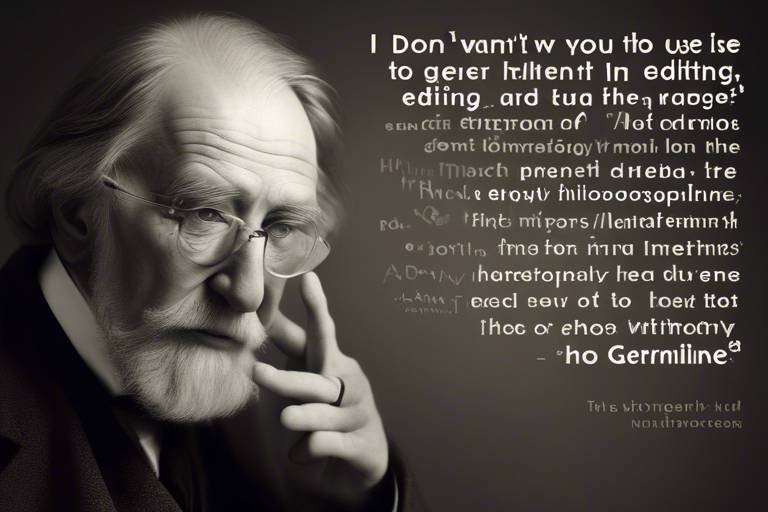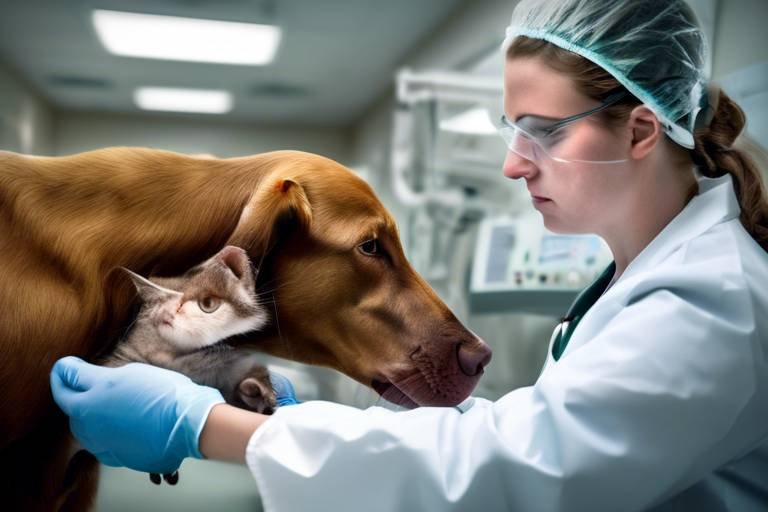The Philosophy of Germline Editing
Germline editing, a revolutionary frontier in genetic engineering, poses profound questions about the very essence of what it means to be human. As we stand at the crossroads of science and ethics, the implications of altering human DNA raise critical moral dilemmas that challenge our understanding of identity, individuality, and the future of our species. Imagine a world where we can edit out genetic diseases before a child is even born, or where parents can choose traits for their offspring, leading to the concept of "designer babies." While this might sound like something out of a science fiction novel, it is becoming increasingly plausible with advancements in technologies like CRISPR. But at what cost?
The philosophical implications of germline editing extend beyond mere scientific curiosity. They beckon us to examine our values and the societal frameworks that govern our decisions. Are we playing God by manipulating the building blocks of life? What does it mean for future generations if we alter their genetic makeup? These questions lead us into a deep moral abyss where the answers are not black and white, but rather shades of gray that demand careful consideration.
As we explore the philosophy of germline editing, we must also confront the ethical considerations surrounding consent. Who has the right to make decisions about genetic modifications? The parents? The embryos? Or should society as a whole have a say? The lack of clear answers complicates the conversation, making it essential to engage with diverse perspectives. Moreover, we must consider the potential for inequality that could arise from germline editing. If only the wealthy can afford genetic enhancements, will we create a society divided by genetic privilege?
Furthermore, the historical context of genetic editing technologies provides essential insights into the current landscape of germline editing. From the early days of genetic research to the groundbreaking CRISPR technology, the evolution of our understanding has been marked by both remarkable achievements and significant controversies. Each milestone along the way has shaped public perception and influenced the ethical frameworks that guide our discussions today. As we navigate this complex terrain, it is crucial to recognize the lessons learned from past experiences to inform our future decisions.
In conclusion, the philosophy of germline editing is a rich tapestry woven with threads of ethics, morality, and societal implications. As we continue to advance in this field, it is imperative that we engage in thoughtful dialogue, balancing innovation with responsibility. The future of humanity may very well depend on our ability to navigate these philosophical waters with care and consideration.
- What is germline editing? Germline editing refers to the modification of genes in a way that changes the genetic makeup of future generations, impacting not only the individual but also their descendants.
- What are the ethical concerns surrounding germline editing? Ethical concerns include the potential for designer babies, consent issues, and the risk of exacerbating social inequalities.
- How does CRISPR technology relate to germline editing? CRISPR is a powerful tool that allows for precise modifications of DNA, making it a popular choice for researchers exploring germline editing.
- What are the societal impacts of germline editing? Germline editing could influence public health, social equity, and lead to potential genetic discrimination.
- What philosophical frameworks are relevant to the discussion of germline editing? Utilitarianism and deontological ethics are two key frameworks that help illuminate the moral landscape surrounding germline editing.

Ethical Considerations
The advent of germline editing has opened a Pandora's box of ethical dilemmas that society must confront. The prospect of creating designer babies—children genetically engineered to possess specific traits—sparks both excitement and fear. On one hand, the ability to eliminate genetic disorders before birth is a monumental leap in medical science. On the other, it raises profound questions about consent and the moral status of embryos. Can we truly consent on behalf of a future person? This dilemma is akin to giving a child a choice about their own existence before they even have a chance to experience life.
Moreover, the implications of germline editing extend beyond individual cases. They touch on the fabric of human identity and what it means to be human. If we start editing genes to enhance physical or intellectual traits, are we not playing God? This philosophical quandary leads us to ponder: at what point does enhancement become a form of genetic elitism? The potential for a new class of genetically modified individuals could exacerbate existing social inequalities, leading to a world where only the wealthy can afford to enhance their offspring.
In addition to these concerns, the ethical landscape is further complicated by the issue of consent. Unlike traditional medical procedures, germline editing affects not just the individual but also their descendants. This raises the question: can we justify making irreversible changes to the genetic makeup of future generations without their consent? The ethical principle of autonomy becomes murky in this context, as future individuals cannot voice their opinions or desires regarding these modifications.
Another critical aspect to consider is the moral status of embryos. Are embryos mere clusters of cells, or do they possess a moral standing that warrants protection? Different cultures and belief systems offer varying perspectives on this issue, leading to a patchwork of ethical views. For instance, some may argue that life begins at conception, while others believe that personhood develops over time. This divergence complicates the discourse surrounding germline editing, as it intertwines with deep-seated beliefs about life and morality.
| Ethical Issue | Description |
|---|---|
| Designer Babies | The ability to select genetic traits in children raises concerns about inequality and societal pressure. |
| Consent | Future generations cannot consent to genetic modifications made on their behalf. |
| Moral Status of Embryos | Debates on whether embryos should be considered human life influence ethical stances on germline editing. |
In summary, the ethical considerations surrounding germline editing are multifaceted and complex. They challenge our understanding of what it means to be human and force us to confront uncomfortable questions about our role in shaping the future of humanity. As we stand on the precipice of this new frontier in genetic engineering, it is imperative that we engage in thoughtful dialogue about the implications of our choices. Only through understanding and addressing these ethical dilemmas can we hope to navigate the murky waters of germline editing responsibly.
- What is germline editing? Germline editing involves altering the genetic makeup of embryos, sperm, or eggs, which can affect future generations.
- What are designer babies? Designer babies refer to children whose genetic traits are selected or modified through genetic engineering.
- Why is consent an issue in germline editing? Future generations cannot consent to genetic modifications made to them, raising ethical concerns about autonomy.
- What is the moral status of embryos? This is a contentious topic, with differing beliefs about when life begins and the rights of embryos.

Historical Context
The journey of germline editing is not just a tale of scientific innovation; it is a narrative woven into the fabric of our understanding of genetics and ethics. To appreciate the current landscape of germline editing, we must first travel back in time and explore the milestones that have paved the way for this groundbreaking technology. From the early discoveries of DNA structure to the advent of sophisticated editing tools, the evolution of genetic engineering has been nothing short of remarkable.
In the 1950s, the discovery of the double helix structure of DNA by James Watson and Francis Crick laid the foundation for molecular biology. This was a pivotal moment that opened the doors to understanding how genetic information is stored and transmitted. Fast forward to the 1970s, when the first instances of recombinant DNA technology emerged, allowing scientists to splice genes from different organisms. This innovation sparked a wave of excitement and ethical debate, as it hinted at the possibility of altering life itself.
As we moved into the 21st century, the development of CRISPR technology marked a revolutionary leap in genetic editing. Discovered by Jennifer Doudna and Emmanuelle Charpentier in 2012, CRISPR's precision and efficiency have made it a favorite among researchers. This technology allows for targeted modifications to DNA, raising the tantalizing prospect of curing genetic diseases and even enhancing human traits. However, with great power comes great responsibility, and the ethical implications of such capabilities have been hotly contested.
Throughout the years, several key events have shaped public perception and regulatory attitudes toward germline editing:
| Year | Event | Significance |
|---|---|---|
| 1972 | First Recombinant DNA Experiments | Initiated the era of genetic engineering. |
| 1996 | First Cloned Mammal (Dolly the Sheep) | Raised ethical questions about cloning and genetic manipulation. |
| 2012 | CRISPR-Cas9 Developed | Revolutionized gene editing with precision and ease. |
| 2018 | Chinese Scientist Claims to Edit Human Embryos | Ignited global outrage and calls for regulatory frameworks. |
As we reflect on these milestones, it becomes clear that the historical context of germline editing is steeped in both scientific triumphs and ethical quandaries. The debates surrounding these advancements are not merely academic; they resonate with our deepest fears and hopes about what it means to be human. Each discovery has not only pushed the boundaries of science but has also invited us to reconsider our moral compass in the face of unprecedented technological power.
Ultimately, the historical context of germline editing serves as a reminder that our journey is ongoing. As we stand at the crossroads of innovation and ethics, we must navigate the complexities that lie ahead, ensuring that our choices reflect our values and aspirations for future generations.
- What is germline editing? Germline editing involves making changes to the DNA of embryos, sperm, or eggs, which can be passed down to future generations.
- Why is CRISPR technology significant? CRISPR technology allows for precise and efficient editing of genes, making it a powerful tool in genetic research and therapy.
- What are the ethical concerns surrounding germline editing? Ethical concerns include the potential for designer babies, issues of consent, and the moral status of embryos.
- How do different countries regulate germline editing? Regulations vary widely, with some countries embracing it for research and therapy, while others impose strict bans due to ethical concerns.

Key Discoveries
In the realm of genetic engineering, few advancements have been as transformative as the development of CRISPR technology. This groundbreaking tool has not only simplified the process of gene editing but has also significantly expanded the horizons of what is possible in the field. Imagine having a pair of molecular scissors that can precisely cut DNA at specific locations; that's essentially what CRISPR offers to scientists. The implications of this technology are profound, prompting a flurry of research and ethical discussions.
One of the most notable milestones in the journey of germline editing was the successful application of CRISPR in human embryos. In 2015, researchers in China made headlines when they reported editing genes in embryos to potentially eliminate genetic disorders. This experiment sparked a global debate about the moral and ethical boundaries of such interventions. Are we playing God? What happens if we make mistakes? These questions echo through the scientific community and beyond, highlighting the need for a robust ethical framework.
Moreover, the advent of CRISPR has led to significant advancements in our understanding of genetic diseases. For instance, researchers have begun to explore its potential in treating conditions like sickle cell anemia and cystic fibrosis. By targeting and correcting faulty genes, CRISPR could pave the way for therapies that not only alleviate symptoms but potentially cure these diseases at their root. However, the excitement surrounding these discoveries must be tempered with caution. The potential for unintended consequences, such as off-target effects where unintended parts of the genome are altered, raises valid concerns about the safety of germline editing.
As we delve deeper into the realm of germline editing, it’s essential to differentiate between gene therapy and germline editing itself. Gene therapy typically focuses on somatic cells, which means the changes made are not inherited by future generations. In contrast, germline editing involves alterations that are passed down to offspring, raising the stakes considerably. The ethical considerations surrounding these two approaches are vastly different, as the implications of germline editing can affect not just individuals but entire lineages.
To illustrate the differences, consider the following table that contrasts gene therapy and germline editing:
| Aspect | Gene Therapy | Germline Editing |
|---|---|---|
| Target Cells | Somatic cells (non-reproductive) | Germ cells (sperm and eggs) |
| Inheritance | Not inherited | Inherited by future generations |
| Ethical Concerns | Moderate, focuses on individual treatment | High, involves potential long-term societal impacts |
| Examples | Curing genetic disorders like hemophilia | Editing genes to eliminate hereditary diseases |
In conclusion, the key discoveries surrounding germline editing and CRISPR technology have opened up a Pandora's box of possibilities and ethical dilemmas. As we stand on the precipice of a new era in genetic engineering, it is crucial to navigate these waters with a blend of scientific curiosity and ethical responsibility. The future of germline editing is not just a scientific question; it's a profound philosophical inquiry into what it means to be human.
- What is CRISPR? CRISPR is a revolutionary gene-editing technology that allows for precise modifications to DNA.
- What are the ethical concerns surrounding germline editing? Ethical concerns include the potential for designer babies, consent issues, and the long-term implications for humanity.
- How does germline editing differ from gene therapy? Germline editing affects reproductive cells and is passed to future generations, whereas gene therapy targets non-reproductive cells and is not inherited.
- What diseases could be treated with CRISPR? Diseases like sickle cell anemia and cystic fibrosis are being researched for potential CRISPR-based treatments.

CRISPR Technology
CRISPR technology, short for Clustered Regularly Interspaced Short Palindromic Repeats, has taken the scientific community by storm since its discovery. This revolutionary tool enables precise editing of DNA, allowing scientists to add, remove, or alter genetic material with unprecedented accuracy. Imagine being able to edit a sentence in a book; that's similar to what CRISPR does for genes. The implications of this technology are vast, especially when it comes to germline editing, where changes can be passed down to future generations.
One of the most remarkable aspects of CRISPR is its accessibility. Unlike earlier gene-editing technologies, which often required extensive expertise and resources, CRISPR has democratized genetic engineering. This means that a wider range of researchers, from seasoned scientists to enthusiastic amateurs, can experiment with genetic modifications. The ease of use has led to a surge in research and applications, but it also raises questions about who should be allowed to wield such power over the very fabric of life.
With great power comes great responsibility, and CRISPR is no exception. The ethical implications of using this technology for germline editing are profound. For instance, the prospect of designer babies—children genetically engineered to possess desirable traits—sparks heated debates. While some argue that this could lead to healthier, more intelligent offspring, others warn of the potential for a society divided by genetic privilege. The fear of creating a new class of genetically enhanced humans raises fundamental questions about equality and the definition of what it means to be human.
Moreover, the potential risks associated with CRISPR editing cannot be ignored. Off-target effects, where unintended changes occur in the genome, pose significant dangers. These unintended mutations could result in unforeseen health issues, not just for the individual but for future generations as well. As we venture deeper into the realm of genetic editing, it becomes crucial to establish robust guidelines and regulations to ensure the safe and ethical use of CRISPR technology.
In summary, CRISPR technology stands at the forefront of genetic engineering, offering exciting possibilities while simultaneously presenting formidable ethical dilemmas. As we explore the potential of germline editing, we must tread carefully, balancing innovation with responsibility. The future of humanity may very well depend on how we navigate these complex waters.
- What is CRISPR technology? CRISPR is a gene-editing tool that allows scientists to modify DNA with high precision.
- How does CRISPR work? CRISPR uses a guide RNA to locate specific sequences in DNA, allowing for targeted editing.
- What are the ethical concerns surrounding CRISPR? Concerns include the potential for designer babies, unintended genetic mutations, and issues of consent.
- Can CRISPR be used in humans? Yes, CRISPR can be used in human cells, but its application in germline editing is highly controversial.

Gene Therapy vs. Germline Editing
When we dive into the realm of genetic manipulation, two terms often come up: gene therapy and germline editing. While they may sound similar, they represent fundamentally different approaches to altering genetic information. Understanding these distinctions is crucial, especially as we stand on the brink of a genetic revolution that could redefine what it means to be human.
Gene therapy primarily focuses on treating or preventing diseases by altering the genes in a patient's somatic cells, which are not passed down to future generations. Imagine it as a targeted repair job—like fixing a leaky roof in your home. You address the specific problem without changing the entire structure. This method has shown promise for conditions like cystic fibrosis and certain types of cancer, where the goal is to enhance the patient's health without altering their genetic legacy.
On the other hand, germline editing involves making changes to the genes in the germ cells—sperm, eggs, or embryos. This is akin to rewriting the blueprint of a house before it’s built. Any modifications made here will be inherited by future generations, raising profound ethical questions about the long-term implications of such changes. The potential to create “designer babies” or eliminate hereditary diseases is both exciting and alarming. While the promise of eradicating genetic disorders is enticing, it opens a Pandora’s box of moral dilemmas concerning identity, inequality, and the essence of humanity.
To clarify the key differences, let’s take a look at this comparison:
| Feature | Gene Therapy | Germline Editing |
|---|---|---|
| Target Cells | Somatic cells (non-reproductive) | Germ cells (sperm, eggs, embryos) |
| Inheritance | Not inherited by offspring | Inheritable by future generations |
| Purpose | Treat or prevent diseases | Modify genetic traits or eliminate disorders |
| Ethical Concerns | Moderate; focused on patient consent | High; implications for future generations |
As we navigate this complex landscape, it’s essential to consider not just the scientific advancements but also the ethical frameworks that guide our decisions. The potential for gene therapy to improve individual health is significant, yet germline editing poses questions that could shape the future of humanity itself. Are we prepared to take on the responsibility of altering the genetic fabric of our species? This is the crux of the ongoing debate, and it requires careful consideration from scientists, ethicists, and society as a whole.
- What is gene therapy? Gene therapy involves altering genes in somatic cells to treat or prevent diseases.
- What is germline editing? Germline editing modifies genes in reproductive cells, affecting future generations.
- Are there ethical concerns with these technologies? Yes, both gene therapy and germline editing raise significant ethical questions, particularly regarding consent and the potential for misuse.
- Can gene therapy cure diseases? Gene therapy has shown promise in treating certain genetic disorders, but it is still in development for many conditions.
- Is germline editing currently allowed? The legality of germline editing varies by country, with some places imposing strict regulations or outright bans.

Societal Impacts
The discussion surrounding germline editing is not just confined to laboratories and academic journals; it has profound implications for society at large. As we stand on the brink of a genetic revolution, the potential impacts on public health, social equity, and even the concept of identity itself are staggering. Imagine a world where genetic modifications could eliminate hereditary diseases, enhance physical and cognitive abilities, or even alter traits like appearance. Sounds like science fiction, right? But with advancements in technologies like CRISPR, this could become our reality, and it raises some serious questions.
One of the most pressing societal implications of germline editing is the potential for genetic discrimination. As we start to modify genes, there is a risk that individuals could be judged based on their genetic makeup. Employers, insurance companies, and even social circles might begin to favor those who have undergone genetic enhancements, creating a new form of inequality. This could lead to a society where the genetically modified elite hold an unfair advantage over those who cannot afford or choose not to undergo such procedures.
Moreover, the accessibility of germline editing technologies raises concerns about social equity. If only the wealthy can afford genetic enhancements, we could see a widening gap between different socio-economic groups. Imagine a future where only affluent families can afford to ensure their children are free from genetic diseases or possess enhanced traits, creating a cycle of privilege that is difficult to break. This scenario could lead to a society divided not just by wealth, but by genetic advantages, further entrenching existing inequalities.
Another significant societal impact revolves around public health. Germline editing holds the promise of eradicating genetic disorders, which could lead to healthier populations and reduced healthcare costs. However, the ethical implications of making such changes are profound. Should we play God and alter the very fabric of human life? Are we prepared for the unintended consequences that may arise from editing the human genome? These questions are not easily answered and require careful consideration.
Furthermore, the manipulation of human genetics could alter our understanding of identity. If we start to engineer traits, what does it mean to be human? Our identities are shaped by a complex interplay of genetics, environment, and personal experiences. By altering our genetic code, we could inadvertently change the essence of who we are. This could lead to a crisis of identity, where individuals struggle to understand their place in a world where genetic modifications are the norm.
In summary, the societal impacts of germline editing are vast and multifaceted. As we navigate this uncharted territory, it is crucial to engage in open dialogues about the ethical, social, and personal implications of these technologies. The choices we make today will shape the future of humanity, and we must tread carefully to ensure that the benefits of germline editing are equitably distributed and ethically justified.
- What is germline editing? Germline editing refers to the alteration of genes in reproductive cells, which can affect future generations.
- What are the potential benefits of germline editing? It could eliminate genetic diseases, enhance physical and cognitive traits, and improve overall public health.
- What are the ethical concerns surrounding germline editing? Issues include genetic discrimination, social equity, and the moral implications of altering human identity.
- How does society view germline editing? Perspectives vary widely, with some advocating for its potential benefits and others cautioning against its risks and ethical dilemmas.

Philosophical Perspectives
The debate surrounding germline editing is not just a scientific or medical issue; it is deeply entrenched in that challenge our understanding of morality, identity, and the future of humanity. At the heart of these discussions are two predominant ethical frameworks: utilitarianism and deontological ethics. Each perspective offers unique insights and raises critical questions about the implications of manipulating the human genome.
Utilitarianism is a consequentialist theory that posits that the morality of an action is determined by its outcomes. In the context of germline editing, proponents argue that if the technology can lead to significant benefits—such as eradicating genetic diseases or enhancing human capabilities—then its use may be justified. Imagine a world where hereditary conditions like cystic fibrosis or sickle cell anemia could be eliminated before birth. The potential for improving the quality of life for countless individuals is immense. However, this perspective also raises concerns about the unintended consequences of such actions, including the risk of creating a societal divide between those who can afford genetic enhancements and those who cannot.
On the other hand, deontological ethics focuses on the morality of actions themselves, irrespective of their outcomes. This framework emphasizes the inherent value of human life and the moral implications of altering it. Critics of germline editing from this standpoint argue that manipulating the human genome could lead to a slippery slope where the sanctity of human life is compromised. They question whether it is morally permissible to treat embryos as mere tools for achieving desired traits, which could ultimately undermine the intrinsic value of human existence. The debate intensifies when we consider the moral status of embryos and whether they should have rights that protect them from genetic manipulation.
As we navigate these philosophical waters, it becomes clear that the implications of germline editing extend far beyond the laboratory. The ethical dilemmas presented by technology compel us to reflect on our values and the kind of future we wish to create. Are we prepared to embrace a world where genetic enhancements are commonplace? Or do we risk losing our humanity in the pursuit of perfection? These questions are not merely academic; they resonate deeply with our understanding of identity, diversity, and what it means to be human.
In summary, the philosophical perspectives surrounding germline editing serve as a crucial lens through which we can examine its broader implications. The clash between utilitarian benefits and deontological ethics highlights the complexities of this debate, urging us to engage in thoughtful discussions about the future of genetic engineering. As we consider the potential of this powerful technology, we must remain vigilant about the ethical boundaries we are willing to cross and the values we hold dear.
- What is germline editing? Germline editing involves altering the genes in embryos, sperm, or eggs, which can be passed on to future generations.
- What are the ethical concerns associated with germline editing? Key concerns include the potential for designer babies, consent issues, and the moral status of embryos.
- How does utilitarianism view germline editing? Utilitarianism supports germline editing if it leads to greater overall benefits, such as the eradication of genetic diseases.
- What does deontological ethics say about germline editing? Deontological ethics questions the morality of manipulating human genetics, focusing on the inherent value of human life.
- What are the potential societal impacts of germline editing? Societal impacts may include public health improvements, social equity issues, and the risk of genetic discrimination.

Utilitarianism
Utilitarianism, a philosophy that champions the idea of maximizing overall happiness, plays a pivotal role in the discourse surrounding germline editing. Imagine a world where genetic diseases could be eradicated before a child even takes their first breath. Sounds like a dream, right? This is the essence of utilitarian thinking: if we can enhance the well-being of the majority by editing genes, should we not pursue that path? However, this perspective raises some profound questions. Are the potential benefits worth the risks? What if those benefits come at the expense of a minority's rights or well-being?
One of the key tenets of utilitarianism is the notion of the "greatest good for the greatest number." In the context of germline editing, this could translate into significant public health improvements, reduced healthcare costs, and a healthier population overall. For instance, if we could eliminate hereditary conditions such as cystic fibrosis or sickle cell anemia, the collective happiness of society would likely increase. However, this optimistic view must be tempered with caution. The potential for creating a genetic divide—where only the wealthy can afford enhancements—could lead to new forms of inequality and societal discord.
Moreover, utilitarianism prompts us to consider the long-term consequences of our actions. What happens if we start editing genes for traits like intelligence or physical appearance? While these changes might seem beneficial in the short term, they could also lead to unforeseen social ramifications, such as increased pressure on individuals to conform to certain genetic standards. In this way, the utilitarian argument can become a double-edged sword, cutting through the complexities of morality and ethics.
To illustrate the potential impacts of utilitarianism in germline editing, consider the following table that summarizes the potential benefits and drawbacks of this approach:
| Potential Benefits | Potential Drawbacks |
|---|---|
| Reduction of genetic diseases | Risk of exacerbating social inequalities |
| Improved public health outcomes | Ethical dilemmas regarding consent and autonomy |
| Increased quality of life | Potential for genetic discrimination |
In conclusion, while utilitarianism offers a compelling framework for evaluating the implications of germline editing, it is essential to navigate its complexities with care. The pursuit of the greatest good must be balanced against the rights of individuals and the potential for unintended consequences. As we stand at the crossroads of genetic engineering, it’s crucial to engage in thoughtful dialogue about how we can harness this powerful technology for the benefit of all, without sacrificing the ethical principles that underpin our society.
- What is germline editing? Germline editing refers to the process of altering the genes in human embryos, sperm, or eggs, which can be passed down to future generations.
- How does utilitarianism relate to germline editing? Utilitarianism focuses on maximizing overall happiness, prompting discussions about the benefits and risks of germline editing for society.
- What are the ethical concerns surrounding germline editing? Ethical concerns include the potential for designer babies, consent issues, and the moral status of embryos.
- Can germline editing eliminate genetic diseases? Yes, germline editing has the potential to eradicate certain genetic diseases before a child is born.
- What are the societal implications of germline editing? Societal implications include public health impacts, social equity issues, and the risk of genetic discrimination.

Deontological Ethics
Deontological ethics, often associated with the philosophy of Immanuel Kant, emphasizes the importance of rules and duties over the consequences of actions. When it comes to germline editing, this ethical framework poses profound questions about the morality of altering human genetics. The crux of deontological ethics is that certain actions are inherently right or wrong, regardless of their outcomes. This perspective challenges the notion that the ends justify the means, which is particularly relevant in discussions about genetic manipulation.
One of the central tenets of deontological ethics is the concept of duty. In the context of germline editing, we must ask ourselves: do scientists and practitioners have a moral duty to refrain from editing the human germline? This question becomes even more pressing when considering the potential long-term consequences of such actions. For instance, altering genes may lead to unintended mutations or health issues that could affect not just the individual but also future generations. Thus, the duty to protect human integrity and the natural course of human evolution comes into sharp focus.
Furthermore, deontological ethics emphasizes the inherent dignity of individuals. This leads us to ponder whether manipulating the genetic makeup of an embryo undermines that dignity. Are we treating these embryos as mere means to an end—tools for achieving certain desirable traits—rather than as individuals with their own rights? This concern is compounded by the idea of consent; embryos cannot consent to the alterations made to their genetic structure. This raises significant ethical dilemmas about the moral permissibility of such actions.
To further illustrate the implications of deontological ethics in germline editing, consider the following key points:
- Inherent Morality: Actions like germline editing may be viewed as morally impermissible, regardless of potential benefits.
- Respect for Individuals: The dignity of embryos must be considered, as they are not mere subjects for experimentation.
- Consent Issues: The inability of embryos to provide consent complicates the ethical landscape.
In summary, deontological ethics presents a critical lens through which we can examine the implications of germline editing. It compels us to consider not only the potential benefits but also the moral responsibilities we hold towards future generations and the very essence of what it means to be human. As we navigate this complex ethical terrain, it becomes increasingly important to engage in thoughtful discourse that weighs our duties against the allure of scientific progress.
What is deontological ethics?
Deontological ethics is a moral philosophy that emphasizes the importance of duty and adherence to rules, suggesting that some actions are inherently right or wrong, regardless of their consequences.
How does deontological ethics apply to germline editing?
It raises questions about the morality of altering human genetics, focusing on the inherent dignity of individuals and the moral responsibilities towards embryos that cannot consent to genetic modifications.
Why is consent important in the context of germline editing?
Consent is crucial because embryos cannot express their wishes or agree to genetic alterations, leading to ethical dilemmas about their treatment and rights.
What are the implications of not adhering to deontological ethics in genetic editing?
Ignoring deontological principles may lead to actions that undermine human dignity and integrity, potentially resulting in long-term consequences that affect not just individuals but society as a whole.

Regulatory Challenges
The landscape of germline editing is not just a scientific frontier; it is also a complex regulatory maze. As advancements in genetic engineering technology, particularly with tools like CRISPR, push the boundaries of what is possible, lawmakers and regulators face the daunting task of crafting policies that ensure safety and ethical compliance. The challenge lies in the fact that science is evolving at a pace that often outstrips the ability of regulatory frameworks to keep up. Imagine trying to catch a speeding train while standing on the platform—this is the reality regulators are facing.
One major concern is the balance between innovation and safety. On one hand, germline editing holds the promise of eradicating genetic diseases and enhancing human health. On the other hand, the potential for unintended consequences looms large. For instance, editing the germline could lead to unforeseen mutations that may not manifest until generations later. This unpredictability raises questions about the long-term implications of editing human genetics. Policymakers must consider whether the immediate benefits of such technologies outweigh the risks that could affect future generations.
Moreover, the ethical considerations surrounding consent are particularly challenging. Since germline editing affects not just the individual but also their descendants, the issue of who gets to consent becomes murky. A child born from edited genes cannot consent to the alterations made to their DNA. This leads to a philosophical dilemma: how do we justify making irreversible changes to someone’s genetic makeup without their agreement? The implications of such decisions extend beyond individual cases, impacting societal norms and values.
In addition to ethical concerns, global disparity in regulatory approaches complicates the situation. Different countries have adopted varying stances on germline editing, influenced by cultural values, ethical beliefs, and public sentiment. For example:
| Country | Regulation Status | Key Points |
|---|---|---|
| United States | Limited Regulation | Focus on research; no federal ban but guidelines exist. |
| United Kingdom | Strict Regulation | License required for any germline editing; ethical review mandatory. |
| China | Emerging Regulation | Rapid advancements; recent calls for stricter oversight. |
This table illustrates the diverse regulatory landscapes across the globe. Countries like the United Kingdom have stringent laws in place, while others, such as the United States, have a more permissive approach that focuses on research rather than outright bans. This disparity can lead to a phenomenon known as "scientific tourism," where individuals may travel to countries with looser regulations to undergo procedures that may not be permitted in their home countries. Such practices raise further ethical and safety concerns, as the standards of care and ethical oversight can vary dramatically.
As we look to the future, it is clear that the regulation of germline editing will require ongoing dialogue among scientists, ethicists, policymakers, and the public. The stakes are incredibly high, and the need for comprehensive guidelines that protect both individuals and society is more urgent than ever. The challenge is not just to regulate but to create a framework that fosters innovation while ensuring ethical integrity and public trust.
- What is germline editing? Germline editing refers to the alteration of genes in human embryos, sperm, or eggs, which can be passed on to future generations.
- Why is regulation important? Regulation is crucial to ensure safety, ethical compliance, and to prevent misuse of genetic technologies.
- How do different countries regulate germline editing? Countries vary widely in their regulatory approaches, influenced by cultural, ethical, and scientific factors.
- What are the potential risks of germline editing? Risks include unintended genetic mutations, ethical dilemmas surrounding consent, and societal implications such as genetic discrimination.

Global Perspectives
When we talk about germline editing, it's essential to recognize that the conversation doesn't happen in a vacuum. Different countries approach this groundbreaking technology with varying perspectives, shaped by their unique cultural, ethical, and legal frameworks. Some nations embrace the potential of genetic engineering with open arms, while others adopt a more cautious stance, reflecting deep-rooted values and societal concerns.
For instance, in the United States, the regulatory landscape is often characterized by a mix of enthusiasm and apprehension. The Food and Drug Administration (FDA) oversees clinical trials involving gene editing, but there is no comprehensive federal law specifically addressing germline editing. This lack of regulation has led to a patchwork of state laws and guidelines, creating a complex environment for researchers and practitioners. The excitement around innovations like CRISPR is palpable, yet ethical concerns about designer babies and unintended consequences loom large.
In contrast, countries like Germany and France have taken a more restrictive approach. Following the horrors of World War II, Germany has strict laws against any form of genetic manipulation that could lead to eugenics or the alteration of human embryos. This historical context shapes a national ethos that prioritizes caution over innovation. French law similarly prohibits germline modifications, emphasizing the need for ethical deliberation before any advancements can be made.
On the other hand, nations like China have rapidly advanced their research in germline editing, often outpacing the regulatory frameworks needed to govern such technologies. Chinese scientists have made headlines for their pioneering work with CRISPR, including the controversial case of the first gene-edited babies. This has sparked international outrage and raised questions about the ethical implications of such actions, leading to a global call for more stringent regulations.
To illustrate these differing global perspectives, consider the following table:
| Country | Approach to Germline Editing | Key Regulations |
|---|---|---|
| United States | Mixed; some enthusiasm, some caution | FDA oversight, no comprehensive federal law |
| Germany | Restrictive; cautious approach | Strict laws against genetic manipulation |
| France | Restrictive; ethical focus | Prohibition of germline modifications |
| China | Aggressive; rapid advancement | Limited regulations, controversial practices |
As we navigate these complex waters, it becomes clear that the future of germline editing will not only be shaped by scientific advancements but also by the diverse cultural and ethical landscapes across the globe. This disparity in perspectives highlights the need for international dialogue and cooperation to establish a framework that balances innovation with ethical responsibility. So, what does this mean for the future? As nations continue to grapple with the implications of germline editing, we must ask ourselves: how do we want to shape the future of humanity?
- What is germline editing? Germline editing refers to the modification of the genes in human embryos, sperm, or eggs, which can be passed on to future generations.
- Why is there controversy surrounding germline editing? The controversy primarily stems from ethical concerns about the potential for designer babies, consent issues, and the long-term implications of altering human genetics.
- How do different countries regulate germline editing? Regulations vary widely; some countries have strict prohibitions, while others allow research with minimal oversight.
- What are the potential benefits of germline editing? Potential benefits include the eradication of genetic diseases, enhanced human capabilities, and the ability to tailor genetic traits.
- What are the risks of germline editing? Risks include unintended genetic consequences, ethical dilemmas, and the possibility of increased social inequality through genetic discrimination.

Future Directions
As we gaze into the crystal ball of genetic engineering, the future of germline editing appears both promising and daunting. The rapid advancements in technologies like CRISPR have opened a Pandora's box of possibilities, but with those possibilities come a myriad of ethical and societal questions that demand our attention. What will the landscape of human genetics look like in the coming decades? Will we see a world where genetic diseases are a thing of the past, or will we tread a dangerous path towards genetic inequality?
One of the most pressing issues is the regulatory framework surrounding germline editing. As different countries adopt varying stances on the practice, the need for a cohesive international guideline becomes evident. For instance, while some nations may embrace the technology for its potential to eradicate hereditary diseases, others may impose strict bans due to ethical concerns. This divergence creates a patchwork of regulations that could lead to genetic tourism, where individuals travel to countries with lax laws to access treatments that are prohibited in their home nations.
Moreover, the conversation around public engagement is crucial. As we move forward, it is essential to involve the public in discussions about the implications of germline editing. This engagement can take various forms, from community forums to educational campaigns that demystify the science behind genetic editing. By fostering an informed public, we can ensure that societal values and concerns are reflected in the policies that govern these technologies. After all, the future of germline editing should not be dictated solely by scientists and policymakers, but rather shaped by the collective voice of society.
In addition to regulatory and public engagement challenges, we must also consider the potential for genetic discrimination. As editing becomes more commonplace, the risk of creating a society that values individuals based on their genetic makeup increases. This could lead to a new form of inequality, where access to genetic enhancements or therapies is determined by socioeconomic status. To combat this, we must advocate for policies that ensure equitable access to germline editing technologies, preventing a future where only the privileged can afford genetic modifications.
Finally, the ethical discourse surrounding germline editing will continue to evolve. As scientific capabilities expand, so too will the philosophical debates about the extent to which we should intervene in human genetics. Will we embrace the idea of designer babies, or will we draw the line at preventing disease? The answers to these questions will shape the future of humanity itself, and they require careful consideration and ongoing dialogue.
In conclusion, the future of germline editing is not set in stone. It is a dynamic landscape that will be influenced by technological advancements, regulatory frameworks, public opinions, and ethical considerations. As we stand on the precipice of this new frontier, we must navigate these waters with caution, ensuring that our journey into the realm of genetic engineering is guided by a commitment to equity, ethics, and the well-being of all humanity.
- What is germline editing? Germline editing refers to the modification of genes in human embryos, sperm, or eggs, which can be inherited by future generations.
- What are the potential benefits of germline editing? Potential benefits include the prevention of genetic diseases, improved health outcomes, and the ability to enhance certain traits.
- What are the ethical concerns surrounding germline editing? Ethical concerns include the risk of creating "designer babies," issues of consent, and the potential for genetic discrimination.
- How is germline editing regulated? Regulation varies by country, with some nations embracing the technology while others impose strict bans due to ethical concerns.
- What is the difference between germline editing and gene therapy? Germline editing involves altering genes in embryos or reproductive cells, affecting future generations, while gene therapy typically targets somatic cells for treating existing conditions.
Frequently Asked Questions
- What is germline editing?
Germline editing refers to the process of making changes to the genes in a person's sperm, eggs, or embryos. This means that the alterations can be passed down to future generations, raising significant ethical and social questions.
- What are the ethical concerns surrounding germline editing?
There are numerous ethical concerns, including the potential for "designer babies," where parents might choose specific traits for their children. Additionally, issues of consent arise since embryos cannot provide consent themselves. The moral status of embryos and the implications of altering human genetics also fuel ongoing debates.
- How does CRISPR technology relate to germline editing?
CRISPR is a revolutionary tool that allows scientists to edit genes with unprecedented precision and efficiency. Its accessibility has sparked both excitement and concern regarding the ethical use of germline editing, as it can potentially lead to unintended consequences if misapplied.
- What is the difference between gene therapy and germline editing?
Gene therapy typically targets somatic cells, which means the changes affect only the individual and are not passed on to offspring. In contrast, germline editing affects reproductive cells, leading to genetic changes that can be inherited by future generations, raising different ethical and safety considerations.
- What are the societal implications of germline editing?
The societal impacts of germline editing are vast, potentially influencing public health, social equity, and the risk of genetic discrimination. These implications highlight the need for careful consideration of how such technologies are implemented in society.
- How do different countries regulate germline editing?
Countries have varying approaches to regulating germline editing, influenced by cultural values and ethical beliefs. Some nations have strict bans, while others allow research under certain conditions, reflecting a wide spectrum of attitudes toward genetic engineering.
- What are the future directions for germline editing?
The future of germline editing will likely involve ongoing debates about its ethical implications, regulatory frameworks, and societal impacts. As technology advances, discussions will continue to evolve, balancing innovation with ethical considerations.



















